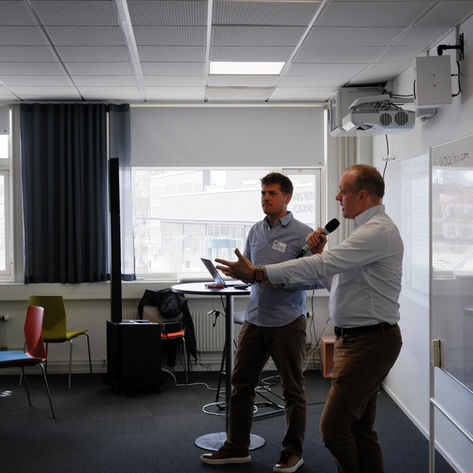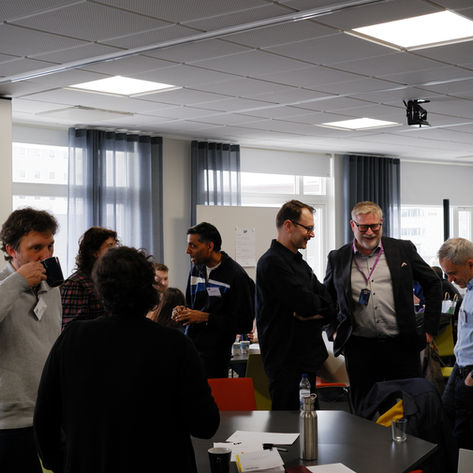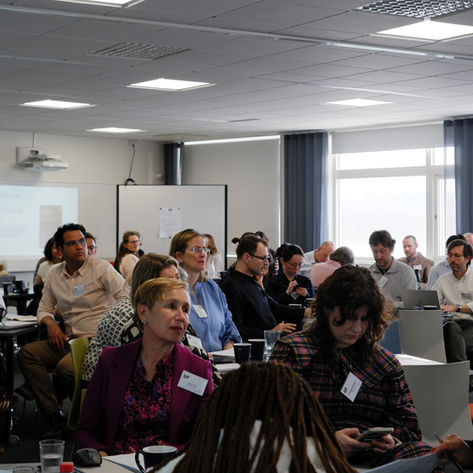

CONFERENCE INFORMATION
10th Annual Entrepreneurship as Practice Conference
April 9th – 11th 2025
Jönköping International Business School

ABOUT THE CONFERENCE
The traditional aims of the conference are to advance our understanding of entrepreneurship-as-practice, foster network ties, facilitate collaborative writing relationships, and build a strong community of practice scholars.
Building on this tradition, our theme for the upcoming conference will be "artefacts and entrepreneuring—The role of other-than-humans in entrepreneurship practices". We would like to explore jointly how adopting a ‘practice lens’ to entrepreneurship research allows us to highlight and theorize the role of other-than-human agents in entrepreneurship. We like to embrace the idea that entrepreneurship is not only a cognitive exercise but essentially mediated through many different artefacts that range from ephemeral narratives and embodiments to physical prototypes (Selden & Fletcher, 2015; Berglund et al., 2020; Berglund & Glaser, 2022). Practice theories offer a theoretical repertoire to make sense of these materializations and their role in different entrepreneurship practices. Let us explore how such concepts as symbolic capitals (Bourdieu, 1986), the contextualities of interaction (Giddens, 1986, p. 282), material arrangements (Schatzki, 1996), or constitutive entanglements (Gherardi, 2012; Orlikowski, 2007), can help us analyze entrepreneurial practices. We also like to explore how adjacent discussions about materiality in entrepreneurship and design (Berglund et al., 2020; Romme & Reymen, 2018) and contextualized entrepreneurship studies (Welter et al., 2019) can benefit from a practice-based approach that can theorize artifacts, not only as distinct and fixed objects but also as relationally existing participants in the ongoing performance of practices.
We welcome all submissions that address entrepreneurship-as-practice more broadly, in addition to those targeting the conference theme.
The conference includes keynote speakers, round table discussions, parallel presentations, a popular Paper Development Workshop, and many opportunities to get to know one another.
Confirmed keynote speakers for the conference:
Prof. Henrik Berglund (Chalmers University of Technology)
Prof. Dimo Dimov (University of Bath)
Prof. Silvia Gherardi (University of Trento)
The 10th version of this Conference will take place in person only at Jönköping International Business School, Sweden. If you are not able to join in person, we have an online symposium every year in the autumn, please see events page
For more up to date information straight to your inbox, sign up to our newsletter here.
BACKGROUND
The practice tradition (also known as practice-based studies, the practice approach or the practice lens) forefronts the notion that practices and their connections are fundamental to all social phenomena (Rouse, 2006; T. Schatzki, Knorr-Cetina, & Savigny, 2001). For entrepreneurship it means that people “perform” ventures, startups and firms on an everyday basis through materially accomplished and ordered practices (Chalmers & Shaw, 2017; Hill,2018; Johannisson, 2011; Vincent & Pagan, 2019). This is to say that descriptions and explanations of entrepreneurship—such as, recognizing, evaluating and exploiting opportunities—are incomplete without the ‘alternate’ description and explanation of how entrepreneurial life is actually lived in and through practices (Gross, Carson, & Jones, 2014; Keating, Geiger, & Mcloughlin, 2013). The term ‘practice’, therefore, does not refer to an ‘empty’ conceptual category of ‘what entrepreneurs think and do’ (Sklaveniti & Steyaert, 2019), but encompasses the meaning-making, identity-forming and order-producing interactions (Chia &Holt, 2006; Nicolini, 2009) enacted by multiple entrepreneurial practitioners and situated in specific (historical) conditions. Therefore, practice theories orient entrepreneurship scholars to take seriously the practices of entrepreneuring as they unfold and are experienced in real-time rather than as they are remembered. Simply put, practice scholars are concerned with the ‘nitty-gritty’ work of entrepreneuring—all the meetings, the talking, the selling, the form-filling and the number-crunching by which opportunities actually get enacted (Matthews, Chalmers, & Fraser, 2018; Whittington, 1996).
For background and information on EaP literature, prior conferences, media and other pertinent materials, please go to: https://www.entrepreneurshipaspractice.com.
The Conference aims at educating interested scholars as well as helps to develop empirical and conceptual papers regarding the ‘practice turn’ taking place in entrepreneurship studies. Building on the first (February 2016 at VU Amsterdam), second (February 2017 at University College Dublin Quinn School of Business), third (April 2018 at Linnaeus University), fourth (April2019 at Nantes Business School), fifth and sixth (virtual events), seventh (April 2022 at Vrije Universiteit Amsterdam), eighth (Leuphana University), and ninth (University of Leeds) Entrepreneurship-as-Practice (EaP) conferences, this conference will be held at Jönköping International Business School, Jönköping University.
FURTHER INFORMATION
Location
This year we are holding the EAP conference event at Jönköping International Business School, Sweden, located in the northwest of Småland at the Southern tip of Lake Vättern (the second largest lake in Sweden). Beyond purely academic conversations, there will also be opportunities to learn about the local industrial history and experience the city’s proximity to Sweden’s nature.
Confirmed speakers
Prof. Henrik Berglund (Chalmers University of Technology)
Prof. Dimo Dimov (University of Bath)
Prof. Silvia Gherardi (University of Trento)
How to join
There are three routes for you to join the Conference:
-
Submit paper to Paper Development Workshop. We welcome submissions to our popular PDW sessions. The abstract is due on 17th January, 2025. Please include the Title, Author Names, and Institutions, and indicate that you are submitting to the PDW. The abstract is a maximum of 500 words. Please submit the abstract here. Upon acceptance, please notify us if you plan to join. Early bird registration and final registration deadline are below. The deadline for the full paper is March 19th, 2025. You can upload your full working paper here. Full papers are 10,000 words maximum including references.
-
Submit an abstract to the Emerging Paper Session. The Emerging Paper Session allows scholars to give and receive feedback on developing ideas or ongoing work that still needs to be developed into a full paper. Early bird registration and final registration deadline are below. The submission deadline for the Emerging Paper Session is March 7th, 2025. Please include the Title, Author Names, and Institutions and indicate that you are submitting to the Emerging Paper Session. The abstract is a maximum of 500 words. Please submit the abstract here. Upon acceptance, we will communicate the date and time for your presentation.
-
No paper, no problem. We welcome scholars of all levels who are interested in EAP. The conference includes many opportunities to learn from keynote speakers, participate in roundtable discussions, and network with EAP scholars. You can also participate as an audience member in the presentations and give feedback on PDW papers. We will have special breakfast mentoring sessions for PhD students and early-career scholars. See registration deadlines below.
Key Dates
January 1st, 2025 General registration opens
January 17th, 2025 Abstract submission deadline for PDW
January 24th, 2025 Notification of acceptance to PDW
February 3rd, 2025 Early-bird registration deadline
March 7th, 2025 Abstract submission to Emerging Paper deadline
March 8th, 2025 Notification of acceptance to presentation session
March 12th, 2025 Registration deadline (All participants)
March 19th, 2025 Full paper submission deadline (those accepted to PDW)
April 9 – 11th, 2025 Conference Dates
Conference Costs
The registration fee includes a welcome reception, lunches and coffee breaks during the conference, and two dinners. Travel and accommodation are not included. For hotel discounts, see below.
3500 SEK (~300 EUR) Early Bird Rate (until 3rd February 2025)
4000 SEK (~350 EUR) Regular Rate (after 3rd February 2025)
2000 SEK (~170 EUR) PhD Student Early Bird Rate (until 3rd February 2025)
2500 SEK (~215 EUR) PhD Student Regular Rate (after 3rd February 2025)
Accommodation
All hotels listed below are within walking distance of the university campus where the conference will occur.
Hotel Name Price per night Booking Discount Code
Elite Stora Hotellet from 90 EUR (approx.) click here 20% via booking link
City Hotel Jönköping from 63 EUR (approx.) email IHAPRIL25
Scandic Portalen from 95 EUR (approx.) click here BJON090425
Vox Hotel from 63 EUR (approx.) click here JU2025
Match Hotel from 130 EUR (approx.) click here
Travel options
Air
-
The closest international airport is Gothenburg Landvetter (GOT) with a direct bus (~1.5h) from the airport to Jönköping (Flixbus or VyBuss)
-
Larger international airports are:
-
Stockholm Arlanda (+ ~4.5h connecting train)
-
Copenhagen Kastrup (+ ~3.5h connecting train)
-
-
Minor airports with limited international connections are located in:
Train
-
Copenhagen – Jönköping is about 3.5h
-
Malmö – Jönköping is about 3h
-
Gothenburg (City; no train connection from airport) – Jönköping is about 2h
-
Stockholm – Jönköping is about 4h
Registration
Early Bird (until 3rd February 2025) - PhD Student (Click Here)
Early Bird (until 3rd February 2025) - General (Click Here)
Full Fee (after 3rd February 2025) - PhD student (Click Here)
Full Fee (after 3rd February 2025) - General (Click Here)
Please send all inquiries to:
EAP10 CONFERENCE PROGRAM
Pre-Conference 8-Apr
10:00 - 15:00 JBVI PDW (separate invitations were sent out; for more information, please visit here)
18:00 EAP 10 Welcome Reception
Main Conference Day 1 9-Apr
09:00 - 09:45 - Conference Opening & Introductions
09:45 - 10:15 - What is "Entrepreneurship-as-Practice"?
Fika (Swedish Coffee Break)
10:30 - 12:00 - Keynote: Silvia Gherardi
Lunch
13:00 - 14:00 - Panel Discussion: Spaces & Places w/ Silvia Gherardi, Ewald Kibler, Inge Hill and others
Fika & Networking
15:00 – 15:30 - Tour through Science Park Jönköping
15:30 – 17:00 - Panel Discussion “How it is to start a business in Sweden”
18:30 - Dinner at Aqua
Main Conference Day 2 10-Apr
08:45 – 09:00 - Arrival
09:00 – 10:00 - Keynote: Henrik Berglund
Fika
10:15 – 11:15 - Keynote: Dimo Dimov
11:15 – 12:00 - Open Reflection & Discussion: Artefacts x Entrepreneuring
Lunch & Group Photo
13:00 – 14:00 - Full Paper PDW
Fika
14:15 – 15:00 - Full Paper PDW (continued)
15:00 – 17:00 - Guided Tour through Match Factory Museum
18:30 - Dinner at Vesterbrunn
Closing Day 11-Apr
09:30 - 10:30 - Emerging Paper PDWs
Fika
10:45 - 12:00 - Guided Joint Reflections
(Takeaway) Lunch
13:00 - 15:00 - Guided Tour through Huskvarna Museum (optional)
evening - Optional dinner and drinks for those leaving on Saturday











